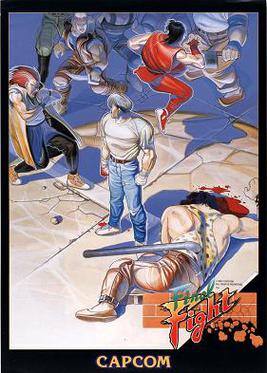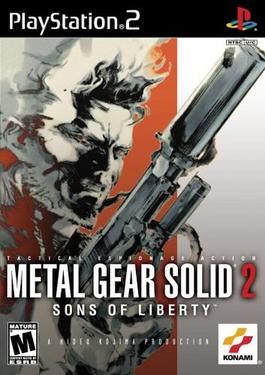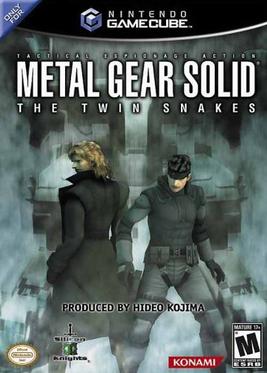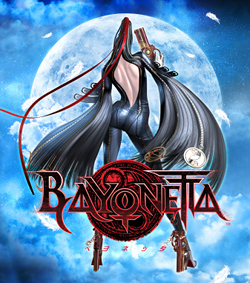Related Research Articles

Metal Gear Solid is an action-adventure stealth video game developed and published by Konami for the PlayStation in 1998. It was directed, produced, and written by Hideo Kojima, and follows the MSX2 video games Metal Gear and Metal Gear 2: Solid Snake, which Kojima also worked on. It was unveiled at the 1996 Tokyo Game Show and then demonstrated at trade shows including the 1997 Electronic Entertainment Expo; its Japanese release was originally planned for late 1997, before being delayed to 1998.

Final Fight is a side-scrolling beat-'em-up video game produced by Capcom. Originally released as an arcade game in 1989, it was the seventh title released for the CP System hardware. Set in the fictional Metro City, the game lets the player control one of three street fighters: former pro wrestler and city mayor Mike Haggar, expert brawler Cody Travers, and modern-day ninja Guy. The trio set out to rescue Jessica when she is kidnapped by the Mad Gear Gang.
In the history of video games, the sixth generation era is the era of computer and video games, video game consoles, and handheld gaming devices available at the turn of the 21st century, starting on November 27, 1998. Platforms in the sixth generation include consoles from four companies: the Sega Dreamcast (DC), Sony PlayStation 2 (PS2), Nintendo GameCube (GC), and Microsoft Xbox. This era began on November 27, 1998, with the Japanese release of the Dreamcast, which was joined by the PlayStation 2 on March 4, 2000, the GameCube on September 14, 2001 and the Xbox on November 15, 2001, respectively. On March 31, 2001, the Dreamcast was among the first to be discontinued. Xbox in 2006, GameCube in 2007 and PlayStation 2 was the last, in January 2013. Meanwhile, the seventh generation of consoles started on November 22, 2005, with the launch of the Xbox 360.
Metal Gear 2: Solid Snake is a 1990 action-adventure stealth video game developed and published by Konami for the MSX2 computer platform. It serves as a sequel to the MSX2 version of the original Metal Gear, written and designed by series's creator Hideo Kojima, who conceived the game in response to Snake's Revenge, a separately-produced sequel that was being developed at the time for the NES specifically for the North American and European markets. The MSX2 version of Solid Snake was only released in Japan, although Kojima would later direct another sequel titled Metal Gear Solid, which was released worldwide for the PlayStation in 1998 to critical acclaim. This later led to Solid Snake being re-released alongside the original Metal Gear as additional content in the Subsistence version of Metal Gear Solid 3 for the PlayStation 2 in 2005. It was also included in the HD remastered ports of Metal Gear Solid 3 released for PlayStation 3, PlayStation Vita, and Xbox 360, and was given a standalone re-release in Japan as a downloadable game for mobile phones and the Wii Virtual Console.

Metal Gear Solid 2: Sons of Liberty is a 2001 action-adventure stealth video game developed by Konami Computer Entertainment Japan and published by Konami for the PlayStation 2. Originally released on November 13, 2001, it is the fourth Metal Gear game produced by Hideo Kojima, the seventh overall game in the series and is a sequel to Metal Gear Solid (1998). An expanded edition, titled Metal Gear Solid 2: Substance, was released the following year for Xbox and Windows in addition to the PlayStation 2. A remastered version of the game, Metal Gear Solid 2: Sons of Liberty - HD Edition, was later included in the Metal Gear Solid HD Collection for the PlayStation 3, Xbox 360, and PlayStation Vita. The HD Edition of the game was included in the Metal Gear Solid: Master Collection Vol. 1 compilation for Nintendo Switch, PlayStation 4, PlayStation 5, Windows, and Xbox Series X/S, which was released on October 24, 2023.

Metal Gear Solid 3: Snake Eater is a 2004 action-adventure stealth video game developed and published by Konami for the PlayStation 2. It was released in late 2004 in North America and Japan, and in early 2005 in Europe and Australia. It was the fifth Metal Gear game written and directed by Hideo Kojima and serves as a prequel to the entire Metal Gear series. An expanded edition, titled Metal Gear Solid 3: Subsistence, was released in Japan in late 2005, then in North America, Europe and Australia in 2006. A remastered version of the game, Metal Gear Solid 3: Snake Eater - HD Edition, was later included in the Metal Gear Solid HD Collection for the PlayStation 3, Xbox 360, and PlayStation Vita, while a reworked version, titled Metal Gear Solid: Snake Eater 3D, was released for the Nintendo 3DS in 2012. The HD Edition of the game was included on the Metal Gear Solid: Master Collection Vol. 1 compilation for Nintendo Switch, PlayStation 4, PlayStation 5, Windows, and Xbox Series X/S on October 24, 2023. The same year, Konami announced a remake, entitled Metal Gear Solid Delta: Snake Eater, set to release for PlayStation 5, Windows, and Xbox Series X/S in 2024.

Metal Gear Solid: The Twin Snakes is a 2004 action-adventure stealth video game published by Konami, who co-developed with Silicon Knights, for the Nintendo GameCube. Released in March, the game is a remake of Metal Gear Solid, originally developed by Konami for the PlayStation in 1998.

Norihiko Hibino is a Japanese video game composer and saxophonist.

Metal Gear Solid 4: Guns of the Patriots is a 2008 action-adventure stealth video game developed by Kojima Productions and published by Konami for the PlayStation 3. It is the sixth Metal Gear game directed by Hideo Kojima. Set five years after the events of Metal Gear Solid 2: Sons of Liberty, the story centers around a prematurely aged Solid Snake, now known as Old Snake, as he goes on one last mission to assassinate his nemesis Liquid Snake, who now inhabits the body of his former henchman Revolver Ocelot under the guise of Liquid Ocelot, before he takes control of the Sons of the Patriots, an A.I. system that controls the activities of PMCs worldwide. The game was released on June 12, 2008.

Alex Otterlei is a multiple award-winning composer who writes evocative and often very filmic music for orchestra, concert band and other ensembles. Alongside, Otterlei has created music and sound effects for theatre, short films, video games, roleplaying games and art installations. His music appears on various albums.
Soundelux Design Music Group is an American sound studio located in Hollywood, California.

Bayonetta is a 2009 action-adventure hack and slash video game developed by PlatinumGames and published by Sega. It was released for PlayStation 3 and Xbox 360 in Japan in October 2009, and in North America and Europe in January 2010. It was released on Wii U in September 2014, Windows in April 2017, Nintendo Switch in February 2018, and PlayStation 4 and Xbox One in February 2020.

Metal Gear Rising: Revengeance is a 2013 action-adventure game developed by PlatinumGames and published by Konami. It was released for the PlayStation 3 and Xbox 360 in February 2013, Windows and OS X in January and September 2014, and Nvidia Shield TV in January 2016.

M2 Co., Ltd. is a Japanese video game developer and publisher, best known for handling emulation of re-released games, such as some Sega Ages titles, Virtual Console titles for Nintendo systems, the 3D Classics series for the Nintendo 3DS and their ShotTriggers range of classic STG games. M2 has also created entirely new titles such as WiiWare games for Konami under the ReBirth moniker and more recently a new GG Aleste game. In addition, M2 currently holds the rights of Aleste series and all NEC Avenue and NEC Interchannel games on TurboGrafx-16 and variants, previously owned by Lightweight.

Otomedius Excellent (オトメディウスX is a scrolling shooter video game, developed and published by Konami for the Xbox 360 video game console. It is the sequel to the 2008 game Otomedius G , a spin-off of the Gradius series. It was released in 2011 on April 21 in Japan and in North America on November 1.

Metal Gear Solid HD Collection is a compilation of remastered ports of Metal Gear video games released for PlayStation 3 and Xbox 360 in 2011 and PlayStation Vita in 2012. The compilation contains Metal Gear Solid 2: Sons of Liberty and Metal Gear Solid 3: Snake Eater on all three platforms, plus Metal Gear Solid: Peace Walker on the home console versions, with the individual games all branded as HD Edition. Bluepoint Games handled the conversions of Metal Gear Solid 2 and 3, while Genki worked on Peace Walker.
The Metal Gear video games consist of 17 different albums, totaling over 940 hours of music within the 11 games. There were four different music labels used for the albums in different games. These include Sony Entertainment, Konami Digital Entertainment, Phantom Studios, Sumthing Else Music Works, and King Records (Japan). The most used record labels were Konami Digital Entertainment and King Records. Konami was used for Metal Gear 20th Anniversary: Metal Gear Music Collection, Metal Gear Solid 4: Guns of the Patriots Original Soundtrack, Metal Gear Solid: Peace Walker Original Soundtrack, and the Metal Gear 25th Anniversary: Metal Gear Music Collection, Metal Gear Rising: Revengeance. King Records was used for Metal Gear 2: Solid Snake Original Soundtrack, Metal Gear Solid Original Game Soundtrack, Metal Gear/ Solid Snake: Music Compilation of Hideo Kojima / Red Dis, Metal Gear Solid 2: Sons of Liberty Original Soundtrack, and Metal Gear Solid 2: Sons of Liberty Soundtrack 2: The Other Side. Several different producers were used for different games. These include Konami, Masahiro Hinami, Noriakio Kamura, Norihiko Hibino, Tojima, Harry Gregson-Williams. Konami producing 6 out of the 11 Metal Gear games. The games used many different genres of music throughout the games. They are as follows: breakbeat, classical, drum and bass, electronic, hip hop, jazz, ambient, acoustic, Latin American, electronic rock, industrial metal, alternative metal, hard rock, power metal, neoclassical, romantic music, lounge, and rock and roll.

"Snake Eater" is the theme song for the 2004 video game Metal Gear Solid 3: Snake Eater, written by Norihiko Hibino and performed by Cynthia Harrell. The song is used within the game's opening sequence, as well as a sequence in which the player climbs a long ladder near the end of the game. Originally composed before the game's development as a substitute track, the song was praised by director Hideo Kojima and the final version was performed by a live orchestra.
References
- ↑ Music 4 Games - The Future of Rock n' Roll & Interactive Entertainment. Est. 1999 Archived 2008-05-06 at the Wayback Machine
- 1 2 "Original Sound Version » Blog Archive » Metal Gear Solid 4: GEM Impact's Story". Archived from the original on 2012-07-23. Retrieved 2008-07-13.
- ↑ Original Sound Version » Blog Archive » First Impressions of GEM Impact's Score for Ninja Blade on the Xbox 360
- ↑ Napolitano, Jayson (February 10, 2009). "Bayonetta // Press Release". Eurogamer . Retrieved 2009-11-11.